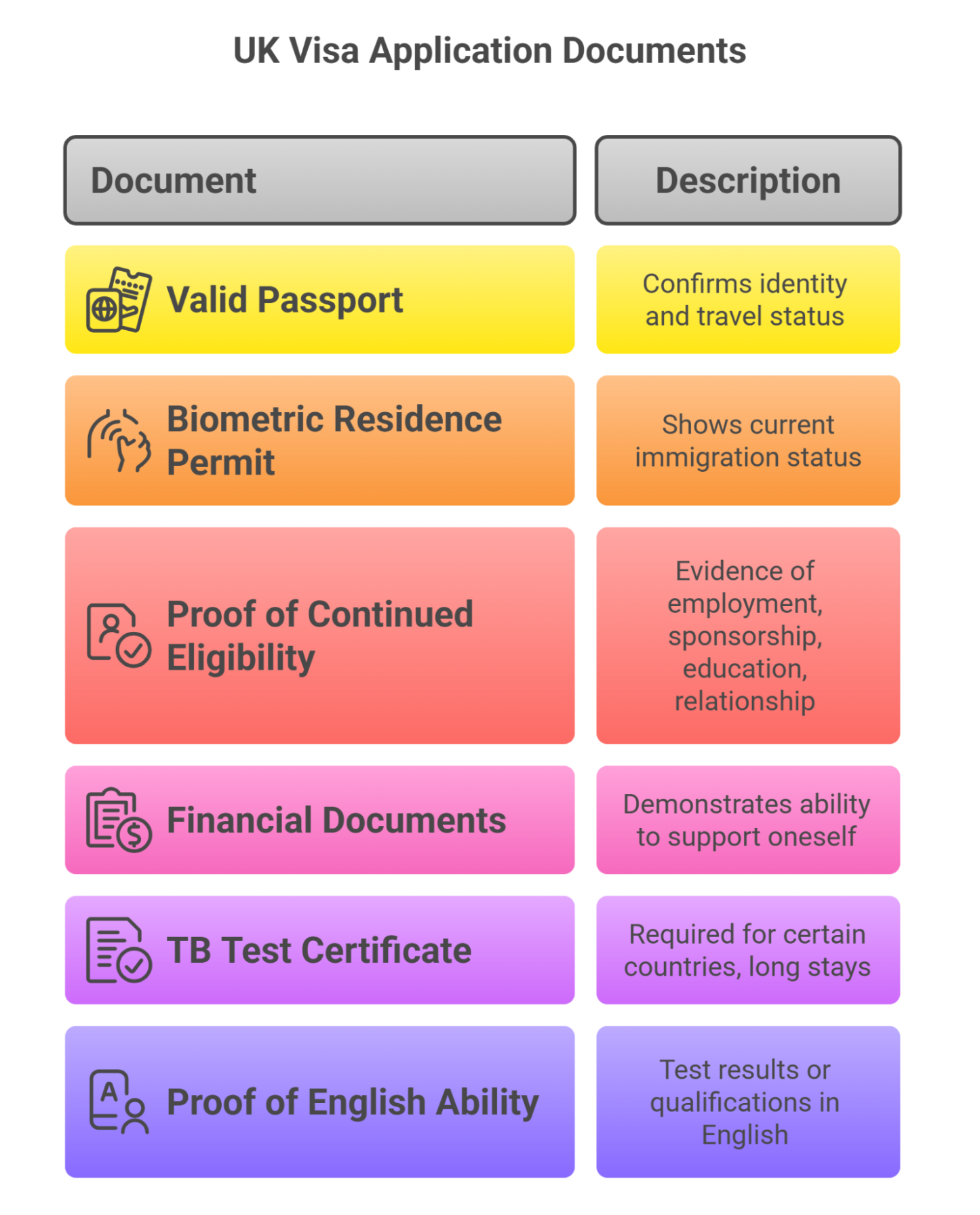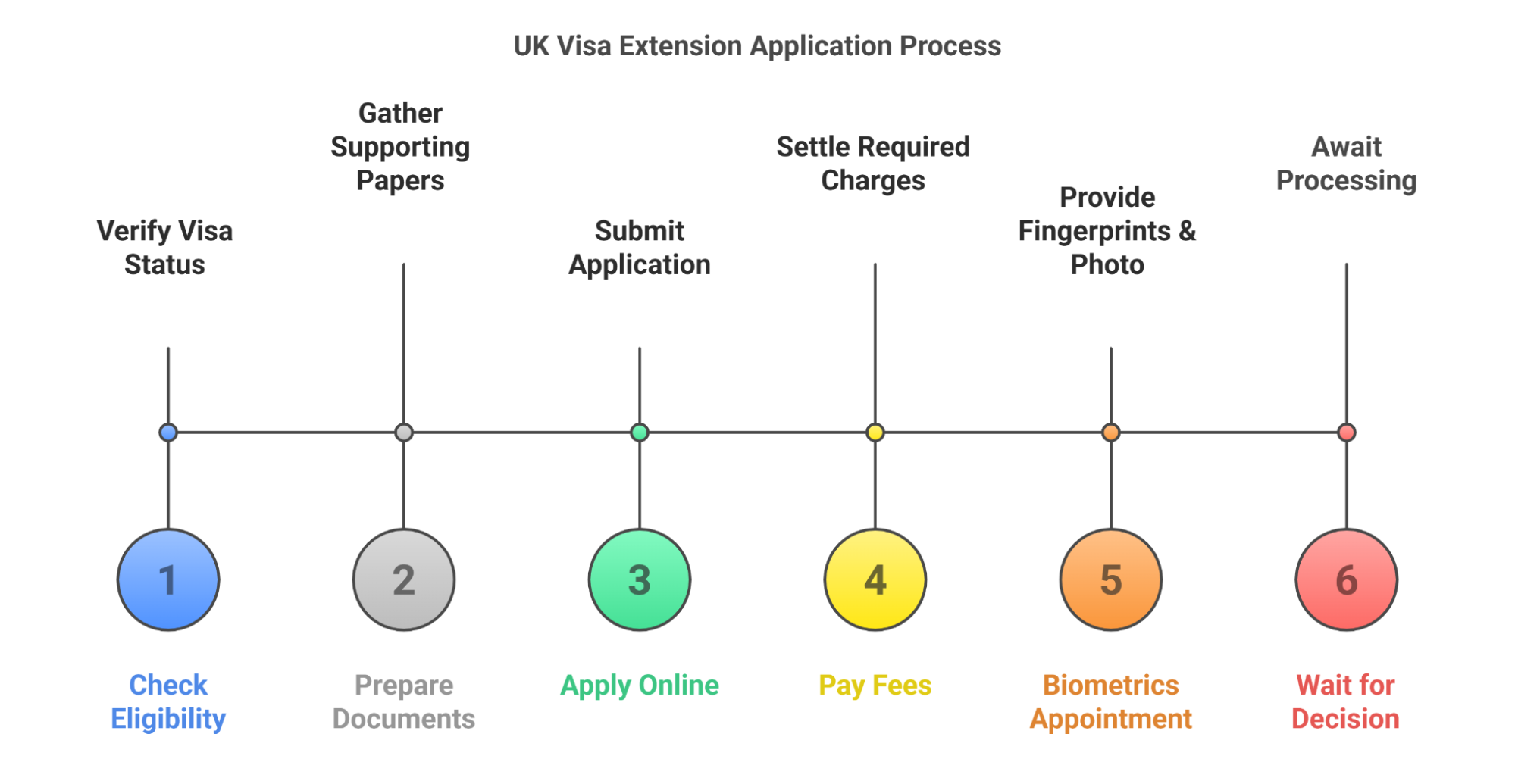Life in the UK can become deeply intertwined with your personal and professional aspirations. Extending your UK visa allows you to stay in the country legally beyond your current visa’s expiry—whether for work, study, family, or other approved purposes. However, not all visa types are extendable, and it’s essential to understand the rules, documents required, and process to avoid overstaying.
Understanding the Basics of UK Visa Extensions
Extending your UK visa, officially known as applying for "Further Leave to Remain," allows you to continue living, working, or studying in the UK beyond the expiry date of your current visa. It's a crucial process for those who meet the eligibility criteria for continued stay under the same or a different visa category (as discussed in our article on switching visas).
It's Important to Understand These Key Ideas for Applicants UK Visa Extensions
|
Valid Visa Requirement: Generally, you must hold a valid UK visa to be eligible to apply for an extension from within the UK. Applying after your visa has expired (overstaying) can have severe consequences on your future immigration status, potentially leading to refusal and even deportation. |
|
Eligibility for Your Visa Category: Each visa category has specific rules regarding extensions. You must meet the particular eligibility criteria outlined for extending your specific type of visa. These criteria can include continued employment, ongoing studies, maintained financial requirements, and adherence to the conditions of your previous visa. |
|
Application from Within the UK: In most cases, you must be physically present in the UK when you submit your extension application. |
|
Specific Application Forms: Different visa categories require different application forms for extension (often under the "Further Leave to Remain" umbrella, such as FLR(IR), FLR(M), FLR(O), etc.). |
|
Timely Application: It's crucial to apply for your visa extension before your current visa expires. You can usually apply up to 28 days before your current visa end date. Applying too late can lead to complications. |
✅ Who Can Apply to Extend a UK Visa?
Not all visas can be extended. You may be eligible to apply for an extension if:
- Your current visa allows for an extension (e.g., Student visa, Skilled Worker visa, Spouse visa).
- You apply before your current visa expires.
- You continue to meet the eligibility requirements of your visa category.
- You are in the UK legally at the time of application.
Common UK Visa Extension Routes
The specific process and requirements for extending your visa will depend entirely on the visa category you currently hold. Here are some of the most common extension routes:
|
Visa Category |
Extension Eligibility & Requirements |
|
Skilled Worker Visa |
You can extend it if you continue working for the same sponsor in an eligible role, meet the required salary threshold, and the employer still holds a valid sponsor licence. |
|
Student Visa |
Extension is possible to complete your current course or start a new one. You must have a valid CAS from a licensed education provider and meet financial requirements. |
|
Spouse/Partner Visa |
After the initial 2.5 years, you must apply for further leave to remain. You must prove the relationship is genuine and subsisting, and meet income and accommodation rules. |
|
Family Visas (Other Types) |
If you’re in the UK as a child or parent of a British citizen/settled person, you must show continued family ties and meet financial and accommodation conditions for an extension. |
|
Graduate Visa |
Not extendable – it's a one-time visa. However, you may be eligible to switch to another visa like the Skilled Worker route if you meet the necessary criteria. |
|
Long Residence (10 Years) |
Those who’ve lawfully lived in the UK for 10 continuous years may apply for Indefinite Leave to Remain (ILR) instead of extending their current visa. |
🛑 UK Visas That Cannot Be Extended
Some UK visas are strictly time-limited and non-renewable, including:
- Visitor visas
- Youth Mobility Scheme visas
- Graduate visa (in most cases)
- UK Ancestry visa (must apply for ILR instead)
- Seasonal Worker Visa
📌 When to Apply for a Visa Extension
It’s crucial to apply before your current visa expires. The Home Office recommends applying:
- No more than 28 days before expiry
- No later than the last valid day of your current visa
If you apply in time, you can stay in the UK legally while your extension is being processed, even if your visa expires during the waiting period.
📄 Documents Required for a UK Visa Extension

The documents you’ll need depend on your visa type, but generally include:
- A valid passport or travel document to confirm your identity and legal travel status.
- Your Biometric Residence Permit (BRP), if you already have one, to show your current immigration status.
- Proof of continued eligibility, such as evidence of employment, a sponsorship certificate, university documentation, or proof of an ongoing relationship—depending on your visa type.
- Financial documents, like bank statements or payslips, to demonstrate you can support yourself without public funds.
- A tuberculosis (TB) test certificate, if you're from a country where this is required and you're applying for a stay longer than 6 months.
- Proof of English language ability, where applicable, such as results from an approved English language test or academic qualifications taught in English.
💷 Fees and Processing Time
Understanding the costs and timeframes involved in extending your UK visa is important for planning ahead. The fees and processing times may vary depending on the service you choose and the type of visa you're
|
Service |
Processing Time |
Fee |
|
Standard Service |
1 - 2 Days |
Varies by visa type |
|
Priority Service (optional) |
6 - 12 Hours |
Additional fee |
|
Super Priority Service |
1 Hour (if available) |
Additional fee |
You may also need to pay the Immigration Health Surcharge (IHS), depending on your visa type and length of stay.
🔄 How to Apply for a UK Visa Extension
While the specifics can vary depending on your visa type, the general process for extending your UK visa from within the UK typically involves the following steps:
- Check Eligibility: Verify that your visa is extendable and you meet all requirements.
- Prepare Documents: Gather all supporting documents relevant to your visa type.
- Apply Online: Visit theOfficial UK Visa Extension Portal and complete the application form.
- Pay Fees: Pay the visa fee and Immigration Health Surcharge (if applicable).
- Book and Attend a Biometrics Appointment: You may need to visit a UKVCAS service point for fingerprints and photo.
- Wait for a Decision: You’ll be notified via email or post. You must remain in the UK legally while your application is being processed.

🧾 What Happens If Your Visa Extension Is Refused?
If your application is denied, you may:
- Be required to leave the UK immediately
- Have limited or no right to appeal, depending on your visa category
- Reapply from outside the UK, if eligible
It’s crucial to seek legal advice or immigration support if your visa extension is refused.
Things to Keep in Mind when Applying for a UK Visa Extension
Extending your visa in the UK requires careful attention to detail. These important reminders can help you avoid mistakes and improve your chances of approval.
- Apply Before Your Current Visa Expires: This is most critical. Overstaying can have severe consequences on your future immigration applications and can lead to removal from the UK. Attempt to apply within the 28-day timeframe before your expiry date.
- Meet All Eligibility Criteria: Go through and ensure you meet each and every requirement for extending your specific visa category. Don't presume based on your initial application. Rules can change..
- Submit Complete and Correct Documentation: The integrity of your application is backed up by the evidence you provide. Ensure all documents are genuine, relevant, and clearly demonstrate your continuing eligibility.
- Understand the Financial Requirements: The majority of visa extensions have their own financial requirements. Ensure that you meet these for the entire period specified and provide sufficient evidence (e.g., bank statements).
- Be Aware of Changes in Immigration Rules: Immigration regulations can change. Always refer to the most recent guidance on the official website.
- Comply with Your Previous Visa Terms: Ensure you have adhered to all terms of your previous visa while you were in the UK. Any breach could negatively impact your extension request.
- Dependants' Extensions: If your family members are in the UK under your visa, they will also need to apply to extend their visas at the same time as you, provided they continue to meet the requirements as your dependants.
- Potential for Interview: The Home Office may require you to attend an interview in some cases as part of your extension application. Be ready to answer questions truthfully and provide further clarification if asked.
- Refusal and Appeal Rights: Be aware of your rights if your extension application is refused. Appeal rights vary according to the visa category.
- Seeking Legal Advice: Should your case be complex, you are unsure of the requirements, or your past applications have been problematic, it is highly recommended that you consult with a qualified immigration solicitor or advisor. They can provide individual advice and make your application as sound as possible.
📌 Summary Table for the Applicants of UK Visa Extension
Extending your UK visa involves understanding the eligibility rules, timing, required documents, and fees. This quick summary table outlines the key aspects every applicant should know before applying.
|
Aspect |
Details |
|
Can it be extended? |
Only certain visas (e.g., Student, Skilled Worker, Spouse) |
|
When to apply? |
Within 28 days before current visa expires |
|
Where to apply? |
Online via the official UK website |
|
Documents needed |
Varies by visa type – typically includes ID, finances, eligibility proof |
|
Processing time |
1 - 2 Days (standard), 6 - 12 Hours (priority), 1 Hour (super priority) |
|
Application fee |
Varies based on visa type and processing speed |
|
IHS fee |
Usually required for most long-term visas |
Frequently Asked Questions
Yes, if you applied before your visa expired and you had work rights under your original visa.
You can remain legally in the UK if you applied in time—this is called “Section 3C leave.”
No, leaving the UK during processing will withdraw your application.
